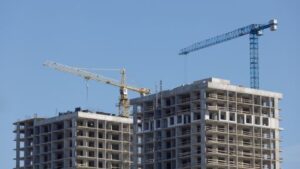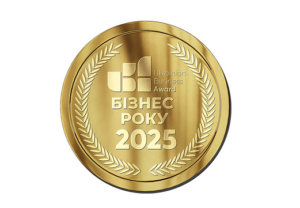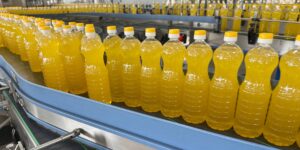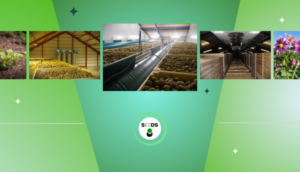
The total area of residential buildings for which construction permits were issued (new construction) in January-June 2025 increased by 45% compared to the same period in 2024, to 2 million 965.2 thousand square meters, according to the State Statistics Service (SSS).
According to the statistics agency, in January-June 2025, the total area of new construction of apartment buildings increased by 45.8% compared to last year, to 2.86 million square meters. The number of apartments in multi-apartment buildings declared at the start of construction increased by 51.5% and amounted to 33 thousand.
The largest number of new homes in the first half of the year was declared in the Kyiv region: the total area of new housing construction was 904,900 square meters (15,500 apartments), which is 2.3 times higher than in the first half of last year.
Significant volumes of new housing in the reporting period were also declared in the Lviv region – 540,700 square meters (6,900 apartments), which is 65% more than in the first half of 2024, as well as in Ivano-Frankivsk – 234,600 square meters (+8%, 3.8 thousand apartments), Zakarpattia region – 159.3 thousand square meters (+11%, 2.4 thousand apartments), Poltava region – 146.9 thousand square meters (1.8 thousand apartments), Vinnytsia – 130.9 thousand square meters (“minus” 38.7%, 2.9 thousand apartments) and Volyn – 115.2 thousand square meters (+17.7%, 2.5 thousand apartments).
In Kyiv, in January-June 2025, the total area of new construction of housing was 367.2 thousand square meters (4.2 thousand apartments), which is 1.9 times more than last year.
The State Statistics Service reminds that the figures do not include territories temporarily occupied by the Russian Federation and parts of territories where hostilities are ongoing (or have been ongoing).
As reported, the total area of new housing construction in Ukraine in 2024 decreased by 7.2% compared to 2023 – to 3.9 million square meters, while in 2023 it was 4.2 million square meters, in 2022 – 6.67 million square meters, and in 2021 – 12.7 million square meters.

Moldova’s Ministry of Energy has prepared an energy strategy for the period up to 2050, which envisages a twofold reduction in electricity imports and a multiple increase in local generation, according to the country’s Minister of Energy, Dorin Jungiatu.
“We are striving to ensure that by 2050, more than 80% of electricity is produced locally from renewable sources (currently about 30%). The strategy envisages new connections with Romania and the European Union, an exchange capacity of 2,000 MW, and the availability of gas and electricity reserves,” he said at the presentation of the strategy. He is quoted by the state agency Moldpres.
According to Jungi, the modernization of the heating systems in Chisinau and Balti will be a priority. The authorities also propose to support the most vulnerable citizens with compensation, develop infrastructure for electric vehicles, launch electrified trains, and install 100,000 “smart” meters in households across the country by 2027.
According to mold-street.com, the cost of the measures planned in the strategy exceeds €41 billion, or more than €1.5 billion per year for the period of its implementation. The bulk of the investment—€17.5 billion—will be needed to transition from hydrocarbons to renewable and alternative energy sources, as well as to expand and modernize the electricity transmission system. More than €9 billion is planned to be allocated to the reconstruction and renovation of buildings and other energy efficiency measures. Another €8.5 billion is earmarked for increasing the capacity of electricity sources.
Overall, the strategy envisages reducing the share of energy imports in the energy balance from 77% to 40% in 2050 by reducing hydrocarbon consumption and completely phasing out coal by 2030.
It is planned that by 2050, Moldova’s own generation capacity will exceed 5,000 MW, doubling the current energy sources (including the Moldovan GRES in Transnistria). There are also plans to increase the capacity of wind farms 12-fold, to 2,600 MW.
At the same time, the authors of the strategy do not rule out the construction of a small modular reactor with a capacity of 300 MW in Moldova by 2050.

Development company Alliance Novobud has presented a report on the construction dynamics at its projects for August 2025.
Montreal House, Kyiv (102 V. Vasylkivska St. / 83 Antonovycha St.)
– Block 1: installation of water and heat supply pipelines has reached 85%, cement screed on the residential floors and in common areas, electrical work is also underway – 30% of readiness.
– Block 2: similar works – pipelines are at 95%, screeding and general works are in progress, electrical installation is at 30%.
– Block 3: installation of aluminum subsystem for translucent structures is underway, the laying of electrical cables to the apartments is completed.
– Block 4: installation of translucent constructions continues (40% complete), cabling of apartments is in progress.
Parking lot (at Montreal House)
– Waterproofing of the top slab is 60% complete, installation of rainwater drainage pipes is in progress.
– Works on connection to water supply and sewage networks are in progress: domestic sewage – 80%, connection to water supply – 70%.
Krona Park II, Brovary (32 Simonenka str.)
– House 3: the certificate of commissioning has been received.
– House 5: internal water supply and sewerage networks are being installed, ground is being laid, basement walls are being insulated, roof construction and window installation are underway (floors 2-5 are ready, works have started on floors 6-7).
– House 8: installation of electrical networks, elevators, facade (section 1 – 75%, section 2 – work has begun).
– Building 9: commissioning works, finishing, landscaping of the adjacent territory.
– House 10: the facade is being completed (95% completed), cold doors are being installed, plumbing and electrical works are in progress.
– House 12: roofing works on sections 1 and 2 continue, installation of PVC windows has started.
– Houses 14 and 16: boroinjection paleo field is completed – 100%.
“Forest Quarter”, Brovary (16, V. Chornovol str.)
– Concrete pouring of the foundation slab of section 1 is completed, preparation of the growth beam of section 2.1 and installation of vertical monolithic structures in section 2.2 is in progress.
Alliance Novobud is a Ukrainian development company operating in the residential and commercial real estate market for more than 18 years. It was founded in the mid-2000s. The headquarters is located in Kiev. The main activity is construction of high-rise residential complexes of comfort and business class, as well as related social and commercial infrastructure.
The company is among the top 20 developers of Kyiv and Kyiv region by the amount of commissioned housing (according to Anbud and LUN profile portals). The total volume of completed projects is estimated at more than 800 thousand sq. m. of housing. At the stage of construction and preparation – about 300 thousand sq. m. more.
Alliance Novobud positions itself as a developer focused on quality and compliance with deadlines. The company regularly publishes reports on construction dynamics, which increases transparency and trust.
In the period 2022-2025, despite the war and economic difficulties, the company continued active construction, which sets it apart from its competitors.
The company’s strategy involves the development of mixed residential neighborhoods with the integration of schools, kindergartens, retail space and recreational areas.
https://interfax.com.ua/news/press-release/1101400.html

The Ukrainian Business Award is an independent award that recognizes the best companies in Ukraine for their contribution to the economy and society. The winners are selected based on objective data and expert opinions.
The award is a confirmation of Rauta’s leadership in the construction market and its contribution to the development of the Ukrainian economy, as the company continues to operate steadily, introduce new technologies and actively participate in the restoration of destroyed buildings during the full-scale invasion. Since 2022, the company has participated in the reconstruction of the Retroville shopping center, two supermarkets and the Novus logistics terminal, Forum Park Plaza in Kyiv, Pinocchio kindergarten in Bucha, and a truck service station in Odesa.

A.V. Export Import LLC (Chortkiv, Ternopil region), whose main specialization is currently the production of oil and animal fats, has begun construction of a vegetable oil refinery in the Chortkiv-West industrial park, according to Chortkiv Mayor Volodymyr Shmatko.
“Finally, construction has begun on the first industrial enterprise in our Chortkiv-West industrial park. Six years of work by the team, COVID, a major war, but investors chose Chortkiv! Thank you to the team for such a wonderful result,” he wrote on Facebook on Tuesday.
According to the materials attached to the post, A.V. Export Import plans to build a sunflower oil refining and deodorization plant with a capacity of 50 tons per day in the first stage in 2025, employing 39 people.
The second stage in 2026 involves the construction of an oil bottling plant with a capacity of 54,000 bottles per day and the employment of 38 workers, and the third stage in 2028 involves the construction of a sunflower seed reception and processing plant with a capacity of 150 tons of seeds per day, employing 56 workers.
IP “Chortkiv-West,” registered in October 2019, was established on a land plot of 87.7 hectares, with a declared term of operation of 30 years.
In the summer of the same year, Shmatko presented the concept of the park and announced the readiness of an investor (whom he did not name) to create an agricultural processing enterprise there, investing about $700 million.
According to the Chortkiv City Council, in November 2024, a memorandum was signed between the city council, the managing company IP “Chortkiv West” – KP “Local Economic Development Agency” and “A.V. Export Import,” which was the first step towards the construction of the enterprise.
A.V. Export Import LLC was established in 2017, and according to opendatabot, in October 2024, it changed its main activity from wholesale trade in food products to the production of oil and animal fats. The authorized capital is UAH 20,000.
Currently, the company is owned by Bulgarian citizen Daria Lupashko-Gurevich (50%), residents Andriy Snizhko (25%), and company director Valery Yureskul (25%).
In 2024, the company increased its net income by 4.7 times compared to 2023, to UAH 256.5 million, with a net profit of UAH 4.55 million (UAH 0.58 million), and in the first half of this year, income exceeded UAH 204 million, with a net profit of UAH 5 million.
A.V. Export Import, Chortkiv-West, CONSTRUCTION, FACTORY, oil refining

The long-awaited revival in the construction of vegetable storage facilities has begun in Ukraine, with small and medium-sized facilities prevailing, Andriy Marushchak, Commercial Director of Van Dyke Techs, told SEEDS in an interview. According to him, this format allows farms to quickly meet local needs, but “storage is not everything”: without parallel development of processing, the effect will be limited.
According to the expert, construction is currently most active in Lviv, Khmelnytsky, Vinnytsia, Cherkasy, Odesa, Dnipro, and Chernihiv regions. The farmers’ decision was influenced by the high cost of logistics: “It is no longer as profitable to transport onions 400-800 km as it is to grow and store them closer to the market,” Marushchak said.
The most promising areas for a quick launch are French fries, dried mashed potatoes, peeled/ready-made potatoes; for onions, peeling, freezing and drying. In countries where processing is already in operation, farmers have gradually scaled up storage facilities from 3 to 30 thousand tons or more; it is logical for the Ukrainian market to follow the same trajectory, the expert emphasizes.
Vegetable consumption in Ukraine is less than 30% of WHO recommendations (≈150-200 g per day versus 600 g), which restrains demand beyond the “borscht set”. In a typical consumption structure, the share of potatoes is 50-60%, cabbage – ~10%, carrots – ~5%, and beets – “very little,” Marushchak said.
For the stable operation of storage and processing plants, it is important for farmers to form commodity lots and fulfill long-term contracts through professionally managed cooperatives, a model that has been successfully operating in the EU, the expert emphasizes.
https://www.seeds.org.ua/ovochesxovishh-v-ukraini-stane-bilshe-fermeri-pochali-aktivne-budivnictvo/